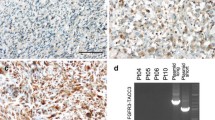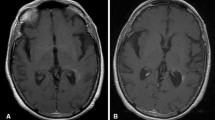Abstract
Purpose
Perifosine (PRF) is an oral alkylphospholipid with antineoplastic effects and reasonable tolerability. It inhibits signaling through the PI3/AKT axis and other cascades of biologic importance in glioblastoma, and has promising pre-clinical activity in vitro and in vivo. Therefore, we conducted a phase II open-label single-arm clinical trial of perifosine for patients with recurrent glioblastoma (GBM).
Methods
We planned to accrue up to 30 adults with recurrent GBM with a minimum Karnofsky Performance Status of 50 following radiotherapy but without other restrictions on the number or types of prior therapy. Concurrent p450 stimulating hepatic enzyme inducing anticonvulsants were prohibited. Patients were treated with a loading dose of 600 mg PRF (in 4 divided doses on day 1) followed by 100 mg daily until either disease progression or intolerable toxicity. The primary endpoint was the 6-month progression free survival (PFS6) rate, with at least 20% considered promising. Accrual was continuous but if 0 of the first 12 patients with GBM reached PFS6, then further accrual would terminate for futility. Patients with other high grade gliomas were accrued concurrently to an exploratory cohort.
Results
Treatment was generally well tolerated; gastrointestinal toxicities were the most common side effects, although none resulted in treatment discontinuation. However, there was limited to no efficacy in GBM (n = 16): the PFS6 rate was 0%, median PFS was 1.58 months [95% CI (1.08, 1.84)], median overall survival was 3.68 months [95% CI (2.50, 7.79)], with no radiographic responses. There was a confirmed partial response in one patient with anaplastic astrocytoma (n = 14).
Conclusions
PRF is tolerable but ineffective as monotherapy for GBM. Preclinical data suggests synergistic effects of PRF in combination with other approaches, and further study is ongoing.
Similar content being viewed by others
References
Stupp R, Taillibert S, Kanner AA, Kesari S, Steinberg DM, Toms SA, Taylor LP, Lieberman F, Silvani A, Fink KL, Barnett GH, Zhu JJ, Henson JW, Engelhard HH, Chen TC, Tran DD, Sroubek J, Tran ND, Hottinger AF, Landolfi J, Desai R, Caroli M, Kew Y, Honnorat J, Idbaih A, Kirson ED, Weinberg U, Palti Y, Hegi ME, Ram Z (2015) Maintenance therapy with tumor-treating fields plus temozolomide vs temozolomide alone for glioblastoma: a randomized clinical trial. JAMA 314(23):2535–2543. https://doi.org/10.1001/jama.2015.16669
Lamborn KR, Yung WK, Chang SM, Wen PY, Cloughesy TF, DeAngelis LM, Robins HI, Lieberman FS, Fine HA, Fink KL, Junck L, Abrey L, Gilbert MR, Mehta M, Kuhn JG, Aldape KD, Hibberts J, Peterson PM, Prados MD (2008) Progression-free survival: an important end point in evaluating therapy for recurrent high-grade gliomas. Neuro Oncol 10(2):162–170. https://doi.org/10.1215/15228517-2007-062
Wong ET, Hess KR, Gleason MJ, Jaeckle KA, Kyritsis AP, Prados MD, Levin VA, Yung WK (1999) Outcomes and prognostic factors in recurrent glioma patients enrolled onto phase II clinical trials. J Clin Oncol 17(8):2572–2578
Ballman KV, Buckner JC, Brown PD, Giannini C, Flynn PJ, LaPlant BR, Jaeckle KA (2007) The relationship between six-month progression-free survival and 12-month overall survival end points for phase II trials in patients with glioblastoma multiforme. Neuro Oncol 9(1):29–38. https://doi.org/10.1215/15228517-2006-025
Wick W, Gorlia T, Bendszus M, Taphoorn M, Sahm F, Harting I, Brandes AA, Taal W, Domont J, Idbaih A, Campone M, Clement PM, Stupp R, Fabbro M, Le Rhun E, Dubois F, Weller M, von Deimling A, Golfinopoulos V, Bromberg JC, Platten M, Klein M, van den Bent MJ (2017) Lomustine and bevacizumab in progressive glioblastoma. N Engl J Med 377(20):1954–1963. https://doi.org/10.1056/NEJMoa1707358
de Almeida Pachioni J, Magalhaes JG, Lima EJ, de Moura Bueno L, Barbosa JF, de Sa MM, Rangel-Yagui CO (2013) Alkylphospholipids: a promising class of chemotherapeutic agents with a broad pharmacological spectrum. J Pharm Pharm Sci 16(5):742–759
Kondapaka SB, Singh SS, Dasmahapatra GP, Sausville EA, Roy KK (2003) Perifosine, a novel alkylphospholipid, inhibits protein kinase B activation. Mol Cancer Ther 2(11):1093–1103
Ruiter GA, Zerp SF, Bartelink H, van Blitterswijk WJ, Verheij M (2003) Anti-cancer alkyl-lysophospholipids inhibit the phosphatidylinositol 3-kinase-Akt/PKB survival pathway. Anticancer Drugs 14(2):167–173
Crul M, Rosing H, de Klerk GJ, Dubbelman R, Traiser M, Reichert S, Knebel NG, Schellens JH, Beijnen JH, ten Bokkel Huinink WW (2002) Phase I and pharmacological study of daily oral administration of perifosine (D-21266) in patients with advanced solid tumours. Eur J Cancer 38(12):1615–1621
Figg WD, Monga M, Headlee D, Shah A, Chau CH, Peer C, Messman R, Elsayed YA, Murgo AJ, Melillo G, Ryan QC, Kalnitskiy M, Senderowicz AM, Hollingshead M, Arbuck SG, Sausville EA (2014) A phase I and pharmacokinetic study of oral perifosine with different loading schedules in patients with refractory neoplasms. Cancer Chemother Pharmacol 74(5):955–967. https://doi.org/10.1007/s00280-014-2569-7
Bailey H, Mahoney M, Ettinger D, Maples W, Fracasso P, Erlichman C (2004) Tolerability and limited activity of perifosine in patients with advanced soft tissue sarcoma (STS): a multicenter phase 2 consortium (P2C) study. In: 16th EORTC-NCI-AACR symposium on molecular targets and cancer therapeutics, Geneva Switzerland. European Journal of Cancer Supplements, p 113
Van Ummersen L, Binger K, Volkman J, Marnocha R, Tutsch K, Kolesar J, Arzoomanian R, Alberti D, Wilding G (2004) A phase I trial of perifosine (NSC 639966) on a loading dose/maintenance dose schedule in patients with advanced cancer. Clin Cancer Res 10(22):7450–7456
Lassman AB, Holland EC (2006) Molecular biology and genetic models of gliomas and medulloblastomas. In: McLendon RE, Bigner DD, Rosenblum MR, Bruner JM (eds) Russell and Rubinstein's pathology of tumors of the nervous system, 7th edn. Arnold Health Sciences, London, pp 1039–1091
Holland EC, Celestino J, Dai C, Schaefer L, Sawaya RE, Fuller GN (2000) Combined activation of Ras and Akt in neural progenitors induces glioblastoma formation in mice. Nat Genet 25(1):55–57
Momota H, Nerio E, Holland EC (2005) Perifosine inhibits multiple signaling pathways in glial progenitors and cooperates with temozolomide to arrest cell proliferation in gliomas in vivo. Cancer Res 65(16):7429–7435
Pitter KL, Galban CJ, Galban S, Tehrani OS, Li F, Charles N, Bradbury MS, Becher OJ, Chenevert TL, Rehemtulla A, Ross BD, Holland EC, Hambardzumyan D (2011) Perifosine and CCI 779 co-operate to induce cell death and decrease proliferation in PTEN-intact and PTEN-deficient PDGF-driven murine glioblastoma. PLoS ONE 6(1):e14545. https://doi.org/10.1371/journal.pone.0014545
Choe G, Horvath S, Cloughesy TF, Crosby K, Seligson D, Palotie A, Inge L, Smith BL, Sawyers CL, Mischel PS (2003) Analysis of the phosphatidylinositol 3′-kinase signaling pathway in glioblastoma patients in vivo. Cancer Res 63(11):2742–2746
Macdonald DR, Cascino TL, Schold SC Jr, Cairncross JG (1990) Response criteria for phase II studies of supratentorial malignant glioma. J Clin Oncol 8(7):1277–1280
Wen PY, Macdonald DR, Reardon DA, Cloughesy TF, Sorensen AG, Galanis E, Degroot J, Wick W, Gilbert MR, Lassman AB, Tsien C, Mikkelsen T, Wong ET, Chamberlain MC, Stupp R, Lamborn KR, Vogelbaum MA, van den Bent MJ, Chang SM (2010) Updated response assessment criteria for high-grade gliomas: response assessment in neuro-oncology working group. J Clin Oncol 28(11):1963–1972. https://doi.org/10.1200/JCO.2009.26.3541
Simon R (1989) Optimal two-stage designs for phase II clinical trials. Control Clin Trials 10(1):1–10
Kaley TJ, Pentsova E, Omuro A, Mellinghoff IK, Nolan CP, Gavrilovic IT, DeAngelis LM, Lacouture ME, Holland EC, Lassman AB (2013) Phase I trial of temsirolimus (TEM) and perifosine (PER) for recurrent or progressive malignant glioma (MG). J Clin Oncol 31(Suppl):Abst2095
Funding
This project was supported by the Brain Tumor Center of Memorial Sloan Kettering Cancer Center, Mr. William H. Goodwin and Mrs. Alice Goodwin and the Commonwealth Foundation for Cancer Research and The Experimental Therapeutics Center of Memorial Sloan Kettering Cancer Center, and Keryx Biopharmaceuticals, Inc. (funding and drug supply, as legacy to Aeterna Zentaris for development of perifosine). In addition, this work was supported by the MSKCC National Cancer Institute Cancer Center Core Grant (P30-CA008748).
Author information
Authors and Affiliations
Contributions
ABL received during the last 3 years (all outside the submitted work): personal fees and non-financial support from Orbus, NW Biotherapeutics, Agios, Celgene, and Novocure; grants, personal fees and non-financial support from Karyopharm, Kadmon, Roche/Genentech, and AbbVie; grants and non-financial support from Oncoceutics, Amgen, Millienium, Celldex, Novartis, Pfizer, Beigene, and VBI Vaccines, non-financial support from Tocagen, BMS; and personal fees from Bioclinica as an expert blinded independent reviewer of clinical and imaging data for a BMS-sponsored trial, prIME Oncology, Sapience, WebMD, Physicians' Education Resource/Chemotherapy Foundation Symposium, Astra Zeneca, and Cortice. TJK: outside the submitted work: research funding (Merck, Ludwig, Eli-Lilly). KSP: outside the submitted work: stock ownership in Johnson $ Johnson, Viking Therapeutics, Pfizer and Catalyst Biotech.
Corresponding authors
Additional information
Publisher's Note
Springer Nature remains neutral with regard to jurisdictional claims in published maps and institutional affiliations.
Rights and permissions
About this article
Cite this article
Kaley, T.J., Panageas, K.S., Mellinghoff, I.K. et al. Phase II trial of an AKT inhibitor (perifosine) for recurrent glioblastoma. J Neurooncol 144, 403–407 (2019). https://doi.org/10.1007/s11060-019-03243-7
Received:
Accepted:
Published:
Issue Date:
DOI: https://doi.org/10.1007/s11060-019-03243-7




